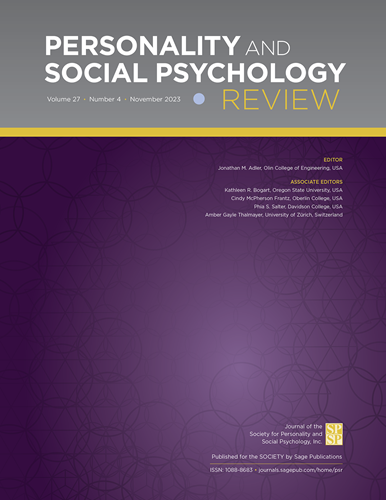Naïve东亚视角下的辩证主义与关系观的兴盛。
IF 10.4
1区 心理学
Q1 PSYCHOLOGY, SOCIAL
引用次数: 0
摘要
学术摘要本文通过结合根植于东亚哲学的naïve辩证法,挑战了以西方为中心的关系质量模型,这些模型将关系的满意度、稳定性(即稳定性)和浪漫的二元关系视为理想。Naïve辩证法包含了对矛盾的容忍、对变化的期待和整体主义。通过研究这些原则在与西方模式不同的关系过程和功能中的表现,我们提供了一个概念化关系繁荣的新框架。具体来说,我们建议接受矛盾,拥抱变化,并认识到嵌入在更广泛的社会文化和制度背景下的关系,可以促进对什么是“良好”关系的更包容的理解。我们的论文强调了将文化理论纳入关系科学的价值,为研究人员提供了可行的建议,并概述了这一观点如何为跨文化关系和单身等新兴研究领域提供信息。摘要本文通过整合东亚哲学来重新定义“好”的恋爱关系,东亚哲学重视矛盾,拥抱变化,强调相互联系。虽然许多西方理想的亲密关系主要集中在满意度、关系方面的稳定性(即稳定性)以及与浪漫伴侣的一对一关系上,但我们建议,拥抱好与坏、起起落落,并将关系视为嵌入更广泛的社会文化和制度背景,可以促进对什么是“好关系”的更包容的理解。通过采用这些见解,我们可以更好地理解和支持各种群体的关系幸福,特别是那些更容易受到东亚文化影响的群体。这种方法不仅促进了对关系功能的文化敏感理解,而且为驾驭新形式的关系(如跨文化关系和单身)提供了见解。本文章由计算机程序翻译,如有差异,请以英文原文为准。
Naïve Dialecticism and Conceptions of Relationship Flourishing From an East Asian Perspective.
Academic AbstractThis paper challenges Western-centric models of relationship quality that deem satisfaction, steadiness in aspects of relationships (i.e., stability), and romantic dyads as ideal by incorporating naïve dialecticism rooted in East Asian philosophies. Naïve dialecticism encompasses the tolerance of contradictions, the anticipation of change, and holism. By examining how these principles manifest in relationship processes and functioning that diverge from Western models, we offer a new framework for conceptualizing relationship flourishing. Specifically, we propose that accepting contradictions, embracing change, and recognizing relationships as embedded within broader sociocultural and institutional contexts could facilitate a more inclusive understanding of what constitutes a "good" relationship. Our paper highlights the value of incorporating cultural theories into relationship science, provides actionable suggestions for researchers, and outlines how this perspective can inform emerging areas of research such as intercultural relationships and singlehood.Public AbstractThis paper redefines what makes a romantic relationship "good" by integrating East Asian philosophies, which value contradictions, embrace change, and emphasize interconnectedness. While many Western ideals of close relationships focus mainly on satisfaction, steadiness in aspects of relationships (i.e., stability), and one-on-one relationship with the romantic partner, we suggest that embracing goods and bads, ups and downs, and recognizing relationships as embedded within broader sociocultural and institutional contexts could facilitate a more inclusive understanding of what constitutes a "good relationship." By adopting these insights, we can better understand and support the relationship well-being of various groups, especially those more prone to the influence of East Asian culture. This approach not only promotes a culturally sensitive understanding of relationship functioning but also provides insights for navigating new forms of relationships, such as intercultural relationships and singlehood.
求助全文
通过发布文献求助,成功后即可免费获取论文全文。
去求助
来源期刊

Personality and Social Psychology Review
PSYCHOLOGY, SOCIAL-
CiteScore
19.00
自引率
1.90%
发文量
20
期刊介绍:
Title: Personality and Social Psychology Review (PSPR)
Journal Overview:
Official journal of SPSP, the Society for Personality and Social Psychology, Inc.
Premiere outlet for original theoretical papers and conceptual review articles in all areas of personality and social psychology
Features stimulating conceptual pieces identifying new research directions and comprehensive review papers providing integrative frameworks for existing theory and research programs
Topics Covered:
Attitudes and Social Cognition: Examines the inner workings of the human mind in understanding, evaluating, and responding to the social environment
Interpersonal and Group Processes: Explores patterns of interaction and interdependence characterizing everyday human functioning
Intergroup Relations: Investigates determinants of prejudice, conflict, cooperation, and harmonious relationships between social groups
Personality and Individual Differences: Focuses on causes, assessment, structures, and processes giving rise to human variation
Biological and Cultural Influences: Studies the biological and cultural mediation of social psychological and personality processes
 求助内容:
求助内容: 应助结果提醒方式:
应助结果提醒方式:


